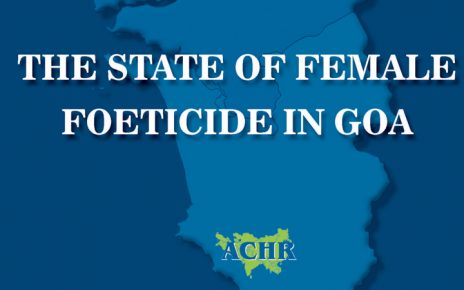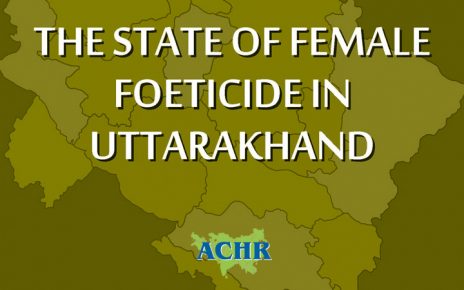A total of 5,04,444 girls from 0-10 years altogether went missing during 2001 – 2011 in Rajasthan as per 2011 census report. Rajasthan recorded 6th lowest Child Sex Ratio (CSR) among 35 States and Union Territories (UTs) of India with the State CSR of 888 against national CSR average of 919.
Rajasthan had a healthy CSR of 954 as per 1981 census. However, it had been consistently falling since then: 916 as per 1991 census, 909 as per 2001 census and 888 as per 2011 census. In terms of points, from 1981 to 2011, the CSR fell by 66 points. The fall in the CSR spreads over the entire State. As per 2011 Census, 27 out of 33 districts of Rajasthan recorded CSR below national average CSR (919) while 12 out of 33 districts recorded CSR below the State average (888). Only three districts of Ganganagar, Jaisalmar and Hanumangarh were the exceptions.
The use of technology for sex selection has been one of the root causes for the drastic and consistent fall in the CSR in Rajasthan.
The Government of Rajasthan has taken a number of measures to address falling CSR by seeking better implementation of the Pre-Conception and Pre-natal Diagnostic Techniques (Regulation and Prevention of Misuse) Act, 1994 (PC&PNDT Act) and launching specific schemes for retention of the girl child.
The programmes for implementation of the PC&PNDT Act include (i) launching of 104 toll free telephone service to facilitate citizens to seek relevant information about medical and health services in the State and also file their grievances/ complaints, including against cases of sex determination; (ii) development and introduction of IMPACT Software- Integrated Monitoring system for the PC&PNDT Act; (iii) SMS to pregnant woman’s mobile number; (iv) tracking devices installed in ultra sonography machines; (v) Mukhbir Yojana to detect illegal sex determination; and (vi) establishment of the PC&PNDT Bureau of Investigation.
As per the Comptroller and Auditor General (CAG) of India which audited social sector funding upto financial year ending on 31st March 2014 to Rajasthan, the performance of the Government of Rajasthan has not been satisfactory.
The CAG stated that the Inspection Committees such as the Appropriate Authorities under the PC&PNDT Act of 1994 were not notified till June 2001 and nomination of members of district level Advisory Committee could not be completed even after lapse of 18 years Further, 18 posts at State level and 3 posts at district level sanctioned in December 2012 in the PC&PNDT Bureau of Investigation were lying vacant at the time of the audit. Consequently, the Bureau of Investigation was not effectively operationalised and it hampered implementation of the Mukhbir Yojana and during December 2011 to March 2014, only seven successful decoy operations were conducted.
The CAG further stated that requisite inspections of sonography centres were not carried out during 2012-2014 and shortfall of inspections was very high and ranged between 55 and 97 per cent.
Further, the CAG report highlighted that the implementation of the schemes for retention of girl child to arrest falling CSR was abysmal. The Mukhyamantri Balika Sambal Yojana (MBSY) launched on 1st April 2007 to promote girl child and provide economic support to her failed to make any impact. Under the scheme, the Government of Rajasthan bought bonds worth Rs. 10,000 under the Children Career Plan (CCP) in Unit Trust of India (UTI) in the name of the beneficiary girl child. As per available records, during April 2007 to September 2015 only 3,450 beneficiaries i.e. 406 beneficiaries per year and 34 beneficiaries per month were covered. Further, the CAG found several irregularities including non-maintenance of records to identify number of beneficiaries eligible under the scheme, inordinate delay in forwarding applications for approval and failure to deposit for issuance of bonds, and no record to ascertain if bonds were issued by the UTI to all beneficiaries.
There seems to be little improvement since the CAG audit.
The Government of Rajasthan nominated three social workers in each of the 33 District Advisory Committees and three social workers in each of the 292 Sub-Division Level Advisory Committees under the PC&PNDT Act in April 2015.
As on December2016, 31 Mukhbirs and 20 pregnant women were awarded for providing accurate information on sex selection and 52 decoy operations were conducted. This still remains highly inadequate.
About 12 staff of the PC&PNDT Bureau of Investigation against sanctioned staff of 18 at the State level were appointed but this is highly inadequate considering that 3 posts at district level sanctioned in December 2012 were lying vacant as of December 2016.
As per information placed before the Parliament by the Ministry of Health and Family Welfare, Rajasthan secured 85 convictions, the highest in the country, under the PC&PNDT Act during 2009-2015.
The Mukhyamantri Shubh Laxmi Yojana (MSLY) which replaced the MBSY from 1st April 2013 had higher outreach with 22,26,817 beneficiaries as on October 2016 but financial assistance of Rs 7,300 to be given in three installments by the 5th year under the MSLY was highly inadequate. The Mukhyamantri Rajshri Yojana (MRY) which replaced the MSLY from Financial Year 2016-17 and increased financial assistance covered 2,22,502 beneficiaries as of October 2016.
Despite some improvements, the Government of Rajasthan needs to bear in mind that the Sex Ratio at Birth (SRB) figures recorded in the Annual Health Survey (AHS) are not encouraging. As per the AHS sample survey during 2011-12 and 2012-13, Rajasthan recorded SRB of 883 in 2011-2012 and 887 in 2012-2013. If the existing under-five mortality rate (U5MR) of 48 deaths per 1,000 births in India is applied in Rajasthan context, the CSR will further reduce drastically far below CSR of 2011 census (888). Though the figures of the AHS are only indicative, they nonetheless show that the MBSY and the MSLY schemes had no impact.
There is no doubt that some of the initiatives of the Government of Rajasthan to combat falling CSR had been innovative. The Mukhbir Yojana has been implemented more effectively in Rajasthan than other States while the PC&PNDT Bureau of Investigation remains unique, though not fully utilised. The Mukhyamantri Rajshri Yojana on paper at least is an improvement upon the previous schemes. The Government of India in a recent (2016) report cited Rajasthan as the best case for implementation of the PC&PNDT Act because of 8,157 inspections, 185 suspensions, 395 cancellations of registration, 432 seal and seizures, 626 complaints filed in the Court and 116 convictions against sonography centres, including dealers/suppliers of the machines. If indeed, Rajasthan fails, India is unlikely to be successful to arrest the falling CSR during 2021 census.
In the light of these, Asian Centre for Human Rights recommends the following to the Government of Rajasthan:
– Revise Mukhymantri Rajshri Yojana (MRY) to increase the amount for post birth benefits of at least Rs. 1 lakh,30 provide educational scholarship of Rs. 50,00031 and further additional financial assistance of
Rs. 1 lakh to be paid to surviving girls for assistance during marriage;
– Expand the coverage under the MRY to include families irrespective of income;
– Undertake specific programme for increasing coverage of all families under the MRY scheme by connecting the programme with all hospitals and schools (both private and government);
– Upload all details of physical and financial achievements of the MRY scheme on a dedicated website and update the website regularly to provide all relevant information such as list of beneficiaries, funds sanctioned and utilization certificates;
– Ensure proper implementation of the PC&PNDT Act inter alia by appointing the Inspection committees, increasing the staff and filling up the vacancies in the PC&PNDT Bureau of Investigation, conducting inspection of each sonography centre at least once in a year and providing human and financial resources for the same, proper implementation of the Mukhbir Yojana, introducing Integrated Monitoring system for PC&PNDT Act and installing tracking devices in all sonography machines and holding time bound trial of the cases under the PC&PNDT Act; and make necessary budgetary allocations for implementation of all these measures.




